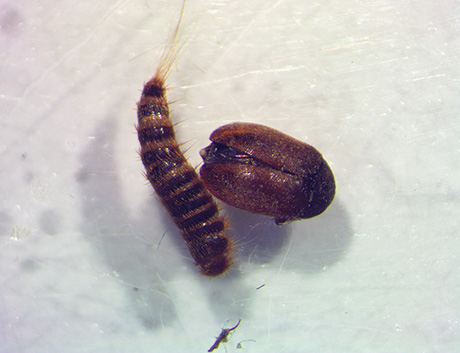Carpet beetle larvae are able to mature under a variety of humidity levels and temperatures although they tend to avoid bright areas.
What causes carpet beetle larvae.
Carpet beetles are small 3 6 millimeters oval or round members of the family dermestidae.
There are many different species of carpet beetles but most adult beetles are small oval shaped insects measuring 1 8 to 1 4 inch long.
They re covered with bristles and shed their skin as they grow.
Carpet mites although you may see the terms carpet mites and carpet beetles used interchangeably these two pests are actually quite different.
Larvae are stored product pests that feed on dried animal products including dry pet food wool garments and linens felt furs feathers even accumulated shed hair and skin flakes of people and pets.
In this post we ll talk about carpet mites what causes carpet beetles where carpet beetles come from and how to avoid a carpet beetle infestation.
If the carpet beetles are in their larvae stage they will search around in the dark looking for food.
Larvae young carpet beetles are 1 8 to 1 4 inch long and tan or brownish.
Both adult carpet beetles and larvae can infest your home but the larvae do the most damage by eating organic materials like wool leather and silk.
Their food preference includes all kinds of fabrics and dead insects.
Larvae are basically immature carpet beetles which have come out of their eggs and are now looking to feed.
Carpet beetles are a common pest that can be found in most residential homes.
Carpet beetle larvae are the form of beetles that comes between the egg stage and the adult stage of their growth cycle.
Most of the reports of carpet beetle allergies involve contact dermatitis in the form of tiny itchy bumps.
They belong to a skin beetle family known as dermestidae.
The adults can crawl and fly.
Carpet beetle larvae and health hazards.
To know where to focus the brunt of your cleaning first look for the primary source of the infestation which will be the area with the most signs of damage and beetles.
The pests can also proliferate on bird nests animal carcasses and dead insects cluster flies lady beetles stink bugs wasps etc which tend to be associated with attics chimneys basements and light fixtures.
Carpet beetles can also thrive on lint hair and debris accumulating under baseboards and inside floor vents and ducts.
Depending on food sources and climate larvae may take over a year to develop into adults.
If someone is exposed repeatedly to the shells of immature carpet beetles in larvae form there is a possibility that someone could develop an allergic reaction.
Carpet beetle larvae measure around 1 4 inch long and are commonly covered with fine hairs or bristles.

